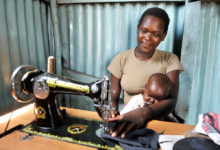Champion young people as ‘drivers of change’, UN chief urges
 Young people must be recognized around the world as “drivers of change” and empowered to become “fully engaged in decisions affecting their future,” said Secretary-General António Guterres on Friday, World Youth Skills Day.
Young people must be recognized around the world as “drivers of change” and empowered to become “fully engaged in decisions affecting their future,” said Secretary-General António Guterres on Friday, World Youth Skills Day.
From climate change to conflicts to persistent poverty, young people are “disproportionately impacted by interlinked global crises,” his Youth Envoy, Jayathma Wickramanayake, told a commemorative event in New York, speaking on behalf of the UN chief.
“Today, we highlight the importance of transforming youth skills for the future of work,” she said, delivering his message from the top.
Youth at risk
The COVID-19 pandemic has exacerbated fragilities, leaving 24 million young people today, at risk of not returning to school and accelerated the labour market’s transformation, “adding uncertainty and widening the digital divide”.
“We must ensure the right of young people to effective and inclusive education, training, and lifelong learning…[by] ramping up youth skills development, while investing in technical vocational education and training (TVET), broadband connectivity, and digital skills,” the message continued.
Countering learning disruption
To this end, top politicians, and leaders from youth and education non-governmental organisations, will meet in September during a Transforming Education Summit at UN Headquarters in New York.
Guided by the UN Youth 2030 strategy, the UN chief urged everyone to “act for youth skills development as a priority, at the Summit and beyond”.
“Together, let us build a more just and thriving workforce, rescue the Sustainable Development Goals (SDGs) and leave no one behind,” his message concluded.
Build skills
As it stands, millions of young people, especially those most vulnerable and marginalized – such as young women and girls – continue to bear the brunt of social, political, economic, and cultural upheaval, General Assembly President Abdulla Shahid said in his video address.
Reminding that these challenges “eliminate jobs and opportunities, reduce access to education, and impede the reskilling and upskilling of young women and men,” he spelled out: “More must be done”.
As “a proud champion of young people,” he upheld that youth must be empowered to build skills through policy making, education, technical and vocational training.
“Let us explore how to increase youth employment opportunities while sustainably reducing the number of uneducated and untrained young people…[and] act collectively to ensure an inclusive and brighter future led by skilful, educated, and well-trained youths, while leaving no one behind,” he said.
‘Be the change’
Speaking via videoconference from Geneva, Martha Newton, Deputy Director-General for Policy at the International Labour Organization (ILO) stressed the importance of fostering digital transformation skills to reach the scale of today’s unmet labour market needs.
To help young people “quickly adapt” to these “rapidly changing demands,” she advocated for quality apprenticeships and internships that would equip them with “skills for life”.
Investing in a world where decent work is the reality of every young person requires scaling up action for youth employment while also protecting the rights of young people. This in in turn, will spark healthy lives and equality for all.
“Be the change you want to be, be relentless, be bold…we can’t transform efforts without you,” she encouraged young people around the world.

© UNESCO-UNEVOC/Teresa de Jesus Caballero MelchorYoung women attend a welding workshop in Mexico.
Empower youth
Speaking on behalf of Audrey Azoulay, Director-General of the UN Educational, Scientific and Cultural Organization (UNESCO), Maki Katsuno-Hayashikawa, Division Director for Education 2030 Support and Coordination, highlighted that skills for the future of work must be identified to empower today’s youth.
She cited innovation in entrepreneurship; promoting flexible pathways to foster lifelong learning; bridging the digital technology gap; and promoting open education resources.
“Encourage youth to think of themselves as agents for change and understand the complexity of sustainable development,” the UNESCO chief’s message said.
During the Education Summit, “we must use all of our power” to provide an opportunity for youth to develop skills for the future and give them “a centre place” at the decision-making table.
Youth: Greatest treasure
Co-chair Peter Mohan Maithri Pieris, Sri Lanka’s Permanent UN Representative, described youth as “the greatest treasure we have on this planet,” adding that if the right decisions are taken at the right time, young people could have a “meaningful” impact around the globe.
In his video message, co-chair, João Gomes Cravinho, Foreign Minister of Portugal, underscored that youth must have a say in their own future and shared his country’s “guiding principle” of “nothing about youth without youth”.



